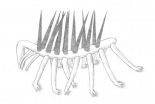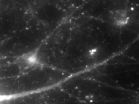(Press-News.org) A team led by researchers at the University of Exeter Medical School and King's College London has uncovered some of the strongest evidence yet that epigenetic changes in the brain play a role in Alzheimer's disease.
Epigenetic changes affect the expression or activity of genes without changing the underlying DNA sequence and are believed to be one mechanism by which the environment can interact with the genome. Importantly, epigenetic changes are potentially reversible and may therefore provide targets for the development of new therapies.
Globally, more than 26 million people are currently affected by Alzheimer's Disease. As this number grows in line with an increasingly aging population, the need to identify new disease mechanisms is more important than ever. Post-mortem examinations have revealed much about how Alzheimer's damages the brain, with some regions, such as the entorhinal cortex, being particularly susceptible, while others, such as the cerebellum, remain virtually unscathed. However, little is yet known about how and why the disease develops in specific brain regions.
The current study found that chemical modifications to DNA within the ANK1 gene are strongly associated with measures of neuropathology in the brain. The study, published in Nature Neuroscience, found that people with more Alzheimer's disease-related neuropathology in their brains had higher levels of DNA modifications within the ANK1 gene. The finding was particularly strong in the entorhinal cortex, and also detected in other cortical regions affected by the disease. In contrast, no significant changes were observed in less affected brain regions or blood.
Professor Jonathan Mill, of the University of Exeter Medical School and King's College London, who headed the study, said: "This is the strongest evidence yet to suggest that epigenetic changes in the brain occur in Alzheimer's disease, and offers potential hope for understanding the mechanisms involved in the onset of dementia. We don't yet know why these changes occur – it's possible that they are involved in disease onset, but they may also reflect changes induced by the disease itself."
Dr Katie Lunnon, first author on the study, from the University of Exeter Medical School, added: "It's intriguing that we find changes specifically in the regions of the brain involved in Alzheimer's disease. Future studies will focus on isolating different cell-types from the brain to see whether these changes are neuron-specific."
Dr Simon Ridley, Head of Research at Alzheimer's Research UK, the UK's leading dementia research charity, who also provided funding for the study said:
"We know that changes to the DNA code of certain genes are associated with an increased risk of developing Alzheimer's disease. Investigating how epigenetic changes influence genes in Alzheimer's is still a relatively new area of study. The importance of understanding this area of research is highlighted by the fact that epigenetic changes have been associated with development of other diseases, including cancer.
"This innovative research has discovered a potential new mechanism involved in Alzheimer's by linking the ANK1 gene to the disease. We will be interested to see further research into the role of ANK1 in Alzheimer's and whether other epigenetic changes may be involved in the disease."
"Alzheimer's affects millions of people worldwide and we need pioneering research to understand exactly why the disease occurs. Alzheimer's Research UK is helping to fund research which will take us a step closer to understanding and defeating this devastating disease."
INFORMATION:
In addition to the University of Exeter Medical School and King's College London, the team included contributors from The Icahn School of Medicine at Mount Sinai, the JJ Peters VA Medical Center, The Johns Hopkins University School of Medicine, Harvard Medical School, the University of Oxford, and Rush University Medical Center, Chicago. They used cutting-edge technology to examine brain tissue from different areas of the brain across three cohorts - the MRC London Brain Bank for Neurodegenerative Disease, the Oxford Thomas Willis Brain Bank, and the Mount Sinai Alzheimer's Disease and Schizophrenia Brain Bank. They analysed three cortical regions, cerebellum, and blood obtained from several hundred individuals representing the spectrum of disease; from those with no evidence of dementia and neurodegeneration, through to patients with very advanced disease.
The research was primarily funded by the National Institutes of Health (NIH), U.S. Department of Health and Human Services, as part of its Epigenomics Roadmap Initiative (grant number R01-AG036039 awarded to Jonathan Mill). To learn more about the NIH initiative that seeks to accelerate research into the relatively new and fast-developing area of epigenetics, go to: https://commonfund.nih.gov/epigenomics/index.
. END
Epigenetic breakthrough bolsters understanding of Alzheimer's disease
A team led by researchers at the University of Exeter Medical School and King's College London has uncovered some of the strongest evidence yet that epigenetic changes in the brain play a role in Alzheimer's disease
2014-08-17
ELSE PRESS RELEASES FROM THIS DATE:
8,000-year-old mutation key to human life at high altitudes
2014-08-17
(SALT LAKE CITY) – In an environment where others struggle to survive, Tibetans thrive in the thin air on the Tibetan Plateau, with an average elevation of 14,800 feet. A study led by University of Utah scientists is the first to find a genetic cause for the adaptation – a single DNA base pair change that dates back 8,000 years – and demonstrate how it contributes to the Tibetans' ability to live in low oxygen conditions. The study appears online in the journal Nature Genetics on Aug. 17, 2014.
"These findings help us understand the unique aspects of Tibetan adaptation ...
Microchip reveals how tumor cells transition to invasion
2014-08-17
VIDEO:
Cancer cells advance across a microchip designed to be an obstacle course for cells. The device sheds new light on how cancer cells invade and could be used to test...
Click here for more information.
PROVIDENCE, R.I. [Brown University] — Using a microengineered device that acts as an obstacle course for cells, researchers have shed new light on a cellular metamorphosis thought to play a role in tumor cell invasion throughout the body.
The epithelial-mesenchymal transition ...
'Cavity protection effect' helps to conserve quantum information
2014-08-17
The electronics we use for our computers only knows two different states: zero or one. Quantum systems on the other hand can be in different states at once, they can store a superposition of "zero" and "one". This phenomenon could be used to build ultrafast quantum computers, but there are several technological obstacles that have to be overcome first. The biggest problem is that quantum states are quickly destroyed due to interactions with the environment. At TU Wien (Vienna), scientists have now succeeded in using a protection effect to enhance the stability of a particularly ...
FDA-approved drug restores hair in patients with Alopecia Areata
2014-08-17
NEW YORK, NY (August 17, 2014) —Researchers at Columbia University Medical Center (CUMC) have identified the immune cells responsible for destroying hair follicles in people with alopecia areata, a common autoimmune disease that causes hair loss, and have tested an FDA-approved drug that eliminated these immune cells and restored hair growth in a small number of patients.
The results appear in today's online issue of Nature Medicine.
In the paper, the researchers report initial results from an ongoing clinical trial of the drug, which has produced complete hair regrowth ...
Fascinating rhythm: Light pulses illuminate a rare black hole
2014-08-17
The universe has so many black holes that it's impossible to count them all. There may be 100 million of these intriguing astral objects in our galaxy alone. Nearly all black holes fall into one of two classes: big, and colossal. Astronomers know that black holes ranging from about 10 times to 100 times the mass of our sun are the remnants of dying stars, and that supermassive black holes, more than a million times the mass of the sun, inhabit the centers of most galaxies.
But scattered across the universe like oases in a desert are a few apparent black holes of a more ...
A shift in the code: New method reveals hidden genetic landscape
2014-08-17
Cold Spring Harbor, NY – With three billion letters in the human genome, it seems hard to believe that adding a DNA base here or removing a DNA base there could have much of an effect on our health. In fact, such insertions and deletions can dramatically alter biological function, leading to diseases from autism to cancer. Still, it is has been difficult to detect these mutations. Now, a team of scientists at Cold Spring Harbor Laboratory (CSHL) has devised a new way to analyze genome sequences that pinpoints so-called insertion and deletion mutations (known as "indels") ...
New home for an 'evolutionary misfit'
2014-08-17
One of the most bizarre-looking fossils ever found - a worm-like creature with legs, spikes and a head difficult to distinguish from its tail – has found its place in the evolutionary Tree of Life, definitively linking it with a group of modern animals for the first time.
The animal, known as Hallucigenia due to its otherworldly appearance, had been considered an 'evolutionary misfit' as it was not clear how it related to modern animal groups. Researchers from the University of Cambridge have discovered an important link with modern velvet worms, also known as onychophorans, ...
Stem cells reveal how illness-linked genetic variation affects neurons
2014-08-17
VIDEO:
Human neurons firing
Click here for more information.
A genetic variation linked to schizophrenia, bipolar disorder and severe depression wreaks havoc on connections among neurons in the developing brain, a team of researchers reports. The study, led by Guo-li Ming, M.D., Ph.D., and Hongjun Song, Ph.D., of the Johns Hopkins University School of Medicine and described online Aug. 17 in the journal Nature, used stem cells generated from people with and without mental illness ...
New Stanford research sheds light on how children's brains memorize facts
2014-08-17
As children learn basic arithmetic, they gradually switch from solving problems by counting on their fingers to pulling facts from memory. The shift comes more easily for some kids than for others, but no one knows why.
Now, new brain-imaging research gives the first evidence drawn from a longitudinal study to explain how the brain reorganizes itself as children learn math facts. A precisely orchestrated group of brain changes, many involving the memory center known as the hippocampus, are essential to the transformation, according to a study from the Stanford University ...
Suspect gene corrupts neural connections
2014-08-17
Researchers have long suspected that major mental disorders are genetically-rooted diseases of synapses – the connections between neurons. Now, investigators supported in part by the National Institutes of Health have demonstrated in patients' cells how a rare mutation in a suspect gene disrupts the turning on and off of dozens of other genes underlying these connections.
"Our results illustrate how genetic risk, abnormal brain development and synapse dysfunction can corrupt brain circuitry at the cellular level in complex psychiatric disorders," explained Hongjun Song, ...
LAST 30 PRESS RELEASES:
Scientists discover why we know when to stop scratching an itch
A hidden reason inner ear cells die – and what it means for preventing hearing loss
Researchers discover how tuberculosis bacteria use a “stealth” mechanism to evade the immune system
New microscopy technique lets scientists see cells in unprecedented detail and color
Sometimes less is more: Scientists rethink how to pack medicine into tiny delivery capsules
Scientists build low-cost microscope to study living cells in zero gravity
The Biophysical Journal names Denis V. Titov the 2025 Paper of the Year-Early Career Investigator awardee
Scientists show how your body senses cold—and why menthol feels cool
Scientists deliver new molecule for getting DNA into cells
Study reveals insights about brain regions linked to OCD, informing potential treatments
Does ocean saltiness influence El Niño?
2026 Young Investigators: ONR celebrates new talent tackling warfighter challenges
Genetics help explain who gets the ‘telltale tingle’ from music, art and literature
Many Americans misunderstand medical aid in dying laws
Researchers publish landmark infectious disease study in ‘Science’
New NSF award supports innovative role-playing game approach to strengthening research security in academia
Kumar named to ACMA Emerging Leaders Program for 2026
AI language models could transform aquatic environmental risk assessment
New isotope tools reveal hidden pathways reshaping the global nitrogen cycle
Study reveals how antibiotic structure controls removal from water using biochar
Why chronic pain lasts longer in women: Immune cells offer clues
Toxic exposure creates epigenetic disease risk over 20 generations
More time spent on social media linked to steroid use intentions among boys and men
New study suggests a “kick it while it’s down” approach to cancer treatment could improve cure rates
Milken Institute, Ann Theodore Foundation launch new grant to support clinical trial for potential sarcoidosis treatment
New strategies boost effectiveness of CAR-NK therapy against cancer
Study: Adolescent cannabis use linked to doubling risk of psychotic and bipolar disorders
Invisible harms: drug-related deaths spike after hurricanes and tropical storms
Adolescent cannabis use and risk of psychotic, bipolar, depressive, and anxiety disorders
Anxiety, depression, and care barriers in adults with intellectual and developmental disabilities
[Press-News.org] Epigenetic breakthrough bolsters understanding of Alzheimer's diseaseA team led by researchers at the University of Exeter Medical School and King's College London has uncovered some of the strongest evidence yet that epigenetic changes in the brain play a role in Alzheimer's disease








